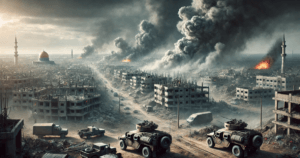Israel’s War Dilemma: Protests, Exhausted Troops, and Fading Support for Gaza Offensive
Israel has intensified airstrikes and ground operations in Gaza, warning of more attacks ahead. However, a full-scale war against Hamas faces challenges due to declining public support, exhausted reservists, and rising political tensions. While military service is mandatory, Israel relies heavily on reservists, many of whom are now reluctant to return after months of fighting. Advocacy groups and soldiers report growing fatigue. Prime Minister Benjamin Netanyahu’s decision to resume attacks has sparked mass protests, with demonstrators accusing the government of prolonging the war for political reasons.
Netanyahu defends the renewed offensive, claiming it aims to rescue 59 remaining hostages. Since Tuesday, tens of thousands have protested in Tel Aviv and Jerusalem, with police using water cannons and making arrests. Clashes escalated after Netanyahu’s government fired Israel’s security chief. Retired General Yaakov Amidror stresses that public support is crucial in a democracy, but with ongoing airstrikes causing heavy casualties, many Israelis now prefer ceasefire talks over further fighting.

Israel’s War Dilemma: Protests, Exhausted Troops, and Fading Support for Gaza Offensive
Israel has recently intensified its military actions in Gaza, launching a series of airstrikes and expanding ground operations. Government officials have described these attacks as only the beginning of a broader offensive. However, experts and former officials warn that pursuing another large-scale war against Hamas may be complicated by mounting public frustration, exhausted military reservists, and deepening political divisions within the country.
While Israel enforces mandatory military service, its defense strategy heavily relies on reservists—citizen soldiers who step in during conflicts. When Hamas militants launched a surprise attack in October 2023, thousands of reservists immediately volunteered. But after months of relentless combat, many are now physically and emotionally drained, with growing reluctance to return to the battlefield. A reservist advocacy group and multiple soldiers who spoke to Reuters described widespread fatigue, raising concerns about the military’s capacity to sustain prolonged warfare.
Prime Minister Benjamin Netanyahu’s recent decision to resume heavy bombings in Gaza on Tuesday has further inflamed public anger. Protesters accuse his government of prolonging the war for political gain, arguing that continued violence endangers the lives of Israeli hostages still held in Gaza. Netanyahu has denied these allegations, insisting the renewed strikes are necessary to pressure Hamas into releasing the remaining 59 captives. Yet, his explanations have done little to calm the outcry.
Over the past few days, tens of thousands of demonstrators have flooded the streets of Tel Aviv and Jerusalem, demanding a ceasefire and criticizing the government’s handling of the crisis. Police responded forcefully, using water cannons to disperse crowds and arrest several protesters. Tensions escalated further on Thursday when clashes erupted near Netanyahu’s residence following his controversial decision to dismiss the head of Israel’s internal security agency, Shin Bet. Critics viewed the move as an attempt to silence dissent and consolidate power.
Retired General Yaakov Amidror, a former security advisor to Netanyahu, stressed that public backing is vital in a democracy, especially during wartime. “Without the people’s support, even the strongest military can’t achieve lasting success,” he noted. However, the government faces an uphill battle in maintaining morale. Recent airstrikes have caused significant civilian casualties in Gaza, drawing global condemnation and intensifying calls for peace talks. Within Israel, many citizens now openly question whether continued fighting will secure their safety or deepen the cycle of violence.
Shifting Public Sentiment
The war’s toll on everyday life is becoming harder to ignore. Families of hostages have led protests, accusing Netanyahu of prioritizing military action over diplomatic solutions to free their loved ones. Others express frustration over the government’s lack of a clear post-war plan for Gaza, fearing endless conflict without tangible goals. Meanwhile, reservists returning from the front lines share stories of harsh conditions and unclear missions, amplifying doubts about the war’s direction.
Political analysts suggest Netanyahu’s hardline stance may be partly motivated by his desire to cling to power. Facing corruption charges and plummeting approval ratings, he has leaned into his reputation as a security hawk to rally his base. However, this strategy risks backfiring as public patience wears thin. Even some members of his coalition government have begun pushing for compromises, signaling cracks in his political armor.
The Human Cost
In Gaza, the humanitarian crisis worsens by the day. Hospitals overwhelmed by casualties struggle with shortages of supplies and electricity. Civilians describe neighborhoods reduced to rubble, with families trapped under debris and nowhere safe to flee. International aid groups warn of famine and disease outbreaks if the blockade and bombing persist.
Back in Israel, the emotional weight of the war is equally heavy. Funerals for soldiers are now routine, and trauma from Hamas’s October attack lingers in communities near the Gaza border. Yet, the rising death toll and lack of progress in freeing hostages have left many Israelis torn between demands for vengeance and desperate hopes for peace.
As pressure builds at home and abroad, the path forward remains uncertain. While Israeli leaders vow to dismantle Hamas, the realities of drained resources, global criticism, and internal strife suggest military victory alone may be unattainable. For now, the cycle of violence continues—with no clear end in sight, and ordinary citizens paying the highest price.
You must be logged in to post a comment.